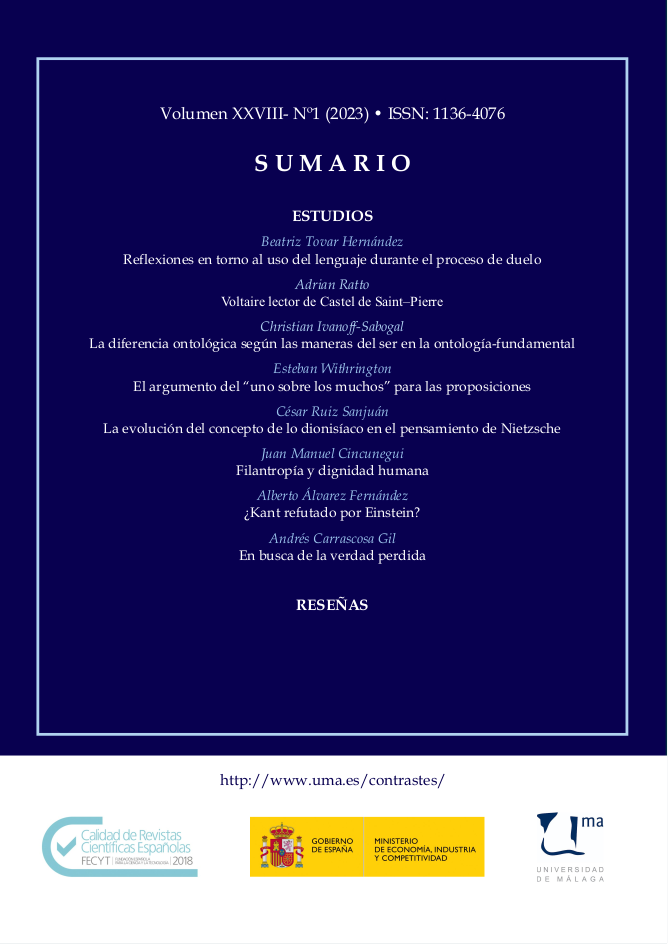Kant refuted by Einstein? The philosophical reception of the Theory of Relativity: Neo-Kantians vs Neopositivists
DOI:
https://doi.org/10.24310/Contrastescontrastes.v28i1.14109Keywords:
Kant, Einstein, neokantism, neopositivism, theory of relativityAbstract
The emergence of Einstein's theory of relativity in the early 20th century sparked debate about the validity of Kantian philosophy. The positivist Schlick argued that it was refuted, since it was inextricably linked to Newton's physics and the concepts of absolute space and time. The Neo-Kantians Natorp and Sellien defended Kant's validity based on the difference between philosophy and science. Cassirer and Reichenbach advocated a modified neo-Kantianism based on constitutive principles. And Einstein and Carnap rejected both pure Kantianism and positivism by embracing epistemological holism.
Downloads
Metrics
Publication Facts
Reviewer profiles N/A
Author statements
Indexed in
-
—
- Academic society
- N/A
- Publisher
- Universidad de Málaga
References
DISALLE, R. 2006: Understanding Spacetime: The Philosophical Development of Physics from Newton to Einstein. Cambridge: Cambridge University Press.
EINSTEIN, A. (1936), «Physik und Realität», Journal of the Franklin Institute, 221, pp. 313-347.
FRIEDMAN, M. 2001: Dynamics of Reason. The 1999 Kant Lectures at Stanford University. Stanford: CSLI Publications.
GONZÁLEZ RUIZ, A. 2003: La nueva imagen del mundo: el impacto filosófico de la Teoría de la Relatividad. Madrid: Akal.
HOWARD, D. (1994), «Einstein, Kant and the origins of logical empirism», en W. C. Salmon y G. Wolters (eds.), Logic, Language, and the Structure of Scientific Theories. Pittsburg: University of Pittsburg Press, pp. 45-105.
KANT, I. [1781/87] 1999: Crítica de la razón pura (ed. bilingüe, trad. Mario Caimi). México: FCE/UAM/UNAM.
KANT, I. [1786] 1989: Principios metafísicos de la ciencia de la naturaleza (trad. Carlos Másmela). Madrid: Alianza.
NATORP, P. 1910: Die logischen Grundlagen der exakten Wissenschaften. Leipzig: Teubner. Accedido en Paderborn: Universitätsbibliothek Paderborn, urn:nbn:de:hbz:466:1-35817 <https://nbn-resolving.de/urn:nbn:de:hbz:466:1-35817>
POINCARÉ, H. 1917: La science et l’hypothèse. Paris: Ernest Flammarion. Accedido en Les Clasiques des sciences sociales: Université du Québec à Chicoutimi. <http://classiques.uqac.ca/classiques/poincare_henri/science_et_hypothese/science_et_hypothese.pdf>
REICHENBACH, H. [1920] 1965: The Theory of Relativity and A priori Knowledge (trad. Maria Reichenbach). Berkeley/Los Ángeles: University of California Press.
REICHENBACH, H. ([1922] 2011), «The Philosophical Significance of the Theory of Relativity», en S. Gimbel y A. Walz (eds.), Defending Einstein. Hans Reichenbach’s writings on space, time and motion. New York: Cambridge University Press, pp. 95-160.
RYCKMAN, T. 2005: The Reign of Relativity. Philosophy in Physics 1915-1925. Oxford: Oxford University Press.
SCHLICK, M. 1920: Space and time in contemporary physics. New York: Oxford University Press.
SCHLICK, M. [1915] 2014: Il significato filosofico del principio di relatività. Brescia: Editrice Morcelliana.
Downloads
Published
How to Cite
Issue
Section
License
This journal provides immediate free access to its content under the principle of making research freely available to the public. All content published in Contrastes. Revista Internacional de Filosofía, are subject to the Creative Commons Attribution-NonCommercial-ShareAlike 4.0 license whose full text can be found at <http://creativecommons.org/licenses/by-nc-sa/4.0>
It is the responsibility of the authors to obtain the necessary permissions of the images that are subject to copyright.
Authors whose contributions are accepted for publication in this journal will retain the non-exclusive right to use their contributions for academic, research and educational purposes, including self-archiving or repository in open access repositories of any kind.
The electronic edition of this magazine is edited by the Editorial Service of the University of Malaga (Uma Editorial), being necessary to cite the origin in any partial or total reproduction.










5.png)
